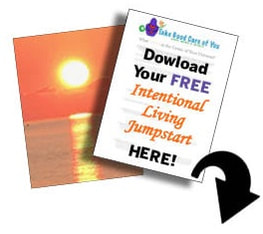|
I recently was asked this question and as a person who left a great career after the sixty hour weeks affected my health, it touched home. While I've been living a consciously simple life for twelve years and enjoy the time and freedom to engage in activities that I want to do, which nourish me and which I feel passionate about, I still have a propensity to workaholism. That said, with my sombrero and Wellness Coach hats on, here are my suggestions: 1. Create a schedule that includes everything that is important to you - rest and sleep, eating well, exercise, relaxation/spiritual practices, fun, socializing, as well as the tasks you are obligated to. Count the “non-work” items as as important as the others and take the fact that they’re on your list seriously. Depending on you, what works for you, what you need at this time, the schedule can be loose or tight or somewhere in between. For instance, there may be certain tasks that must be done at specific times: picking someone up, a meeting, taking medications or eating at specific times. Everything else can be fit in between those. Somedays there may be no time-related tasks. On these days, if you feel you can trust yourself to not just do the obligatory tasks or only do the self-care tasks, then you can flow. If you choose a flow day, look at the schedule at the start of and throughout the day to keep in mind what you’ve committed to for that day and check them off as you do them. If flowing is too unstructured for you then you can also schedule everything in. Be literal and keep track of your time. Allow for 15 minutes leeway for unexpected occurrences. Check items off the list as you do them no matter how you choose to structure your day. I suggest making the list for the next day the night before and really looking at what will be feasible to do of the “non-obligatory” in relation to the “obligatory” items. Some days you may be able to do everything on the list, other days you may have to choose a couple non-negotiable items from your personal self-care list to do.
2. Another strategy is to do the not obligatory items that are critical to your peace and well-being FIRST, before the other “work”. For instance, start your day with meditation, exercise and instrument practice. Then, no matter how the day progresses, at least you’ll feel good that you did the important basics. Some days it’s possible to have balance moment to moment - a little work, a little self-care that isn’t “work”. Other days may look like: a chunk of self-care time and then a chunk of work time. Some periods of life are more difficult to balance. During these times try to have a larger perspective view and see the over all balance. 3. Do your best, not expecting perfection while aiming towards it. Appreciate every little step that shows improvement. I offer this from my own experience and from working with coaching clients. I hope it is helpful! I would love to hear your questions and comments. I will read and respond!
2 Comments
July Padrón Scott
11/15/2023 06:23:41 pm
Muy interesante Robin, trato de llevar una agenda, sin embargo a veces me falta tiempo para los momentos de descanso que ahora me esfuerzo por lograr. Gracias tomaré tus tips. Un abrazo
Reply
Robin
11/17/2023 07:28:56 pm
Gracias por leer y reflecionar, July! Que sea útil en incrementar más equilibrio a tu día, en particular incluir las cosas no obligatorios pero sin embargo critical para tu satisfacción, plenitud, paz y bienestar.
Reply
Leave a Reply. |
Robin Rainbow GateI help people midlife and beyond to find their inner power, health and well being through slow, conscious living Ready to live Your True Life? |
|
|
Sign up here for
|
 Take Good Care of You Wellness Website and Contents by Robin Rainbow Gate is licensed under a Creative Commons Attribution-NoDerivatives 4.0 International License. |


